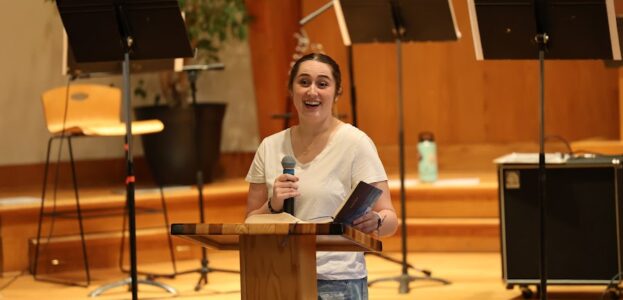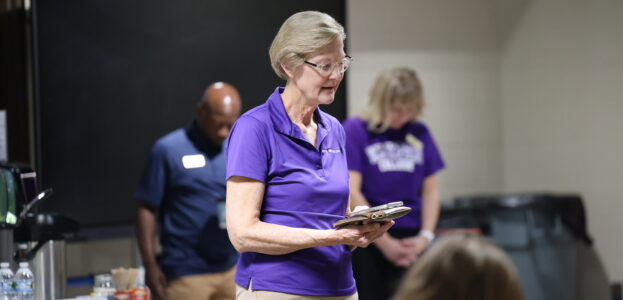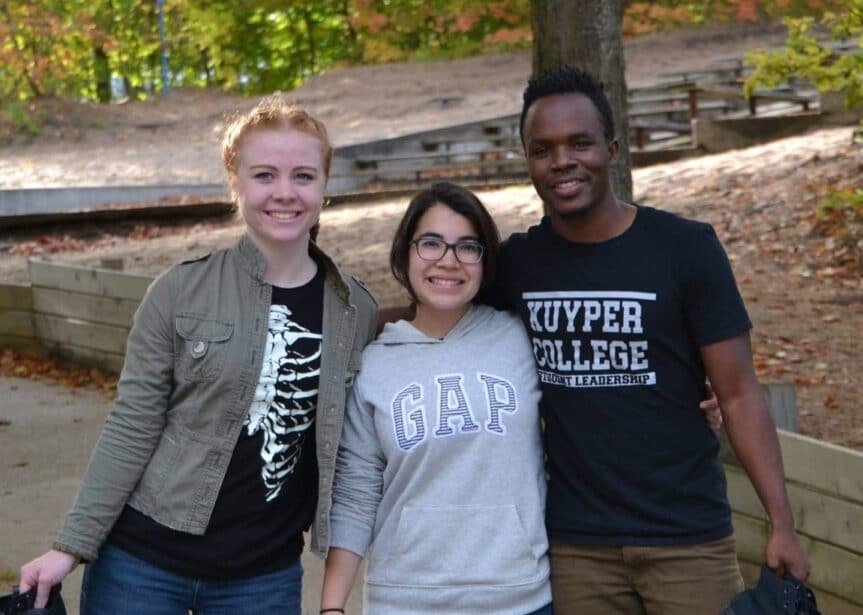The Work of Faith: Kuyper Becomes a Work College
Ora Et Labora is a Latin phrase meaning “pray and work.” Anyone who has spent time at Kuyper College will recognize it from the official seal as the school’s motto. From the very beginning, this idea has been infused into every part of life at the College. The community is defined by both prayer and work, seeking to live lives of worship by loving and serving both God and each other. To further this vision, Kuyper College is entering an exciting period of growth as it transitions to a new educational model: becoming a work college.
When Dr. Patricia Harris came to Kuyper as provost eight years ago, she immediately began engaging in conversations about how to better serve the students. She and the other members of the president’s cabinet agreed that it was necessary to address student experience both on campus and potentially in a new, more urban setting. Soon, she had the opportunity to assemble a task force to brainstorm ways to make these dreams a reality.
“At our first meeting, we talked about the idea of becoming a work college,” recalled Dr. Harris. Work colleges are institutions committed to community service, something that has been part of Kuyper’s DNA since its inception in 1939 as a missionary training school. “When I came to Kuyper, I saw that it had not only excellent and dedicated faculty and staff, but students as well. They clearly wanted to learn not only inside the classroom, but also outside of it. And I’m not just talking about internships. Many of the jobs available on campus are filled by students. Kuyper College has always been a place that relies on student work,” she added.
Whereas a traditional program might require students to take on internships that are one small part of their degree, work-based learning is a core component of study at a work college. Dr. Harris noted, “We wanted to integrate the work students do in the classroom with the work they do in a job placement. We also recognized that this could be a way to make college more affordable and accessible to students of all backgrounds. So, we thought, this model fits Kuyper.”
Though the way they operate may seem similar to the Federal Work-Study program, work colleges do not differentiate between those who must work to cover their educational costs from those who do not require aid. They also receive a different federal designation, accompanied by government funding to help subsidize student employment. Currently, there are nine federally recognized work colleges in the nation that meet the requirements for operation as overseen by the U.S. Department of Education. Kuyper College would become the 10th.
Dr. Harris and her think tank needed to develop a plan for building this type of program, so they began learning everything they could. “We researched and visited a number of work colleges around the country. We also put together various other task forces and met to discuss all the issues that would go into developing this idea,” she said.
One of the institutions they began learning from was Paul Quinn College, located in Dallas, Texas. Paul Quinn is a private, historically Black Methodist college. Today, the college is recognized as one of the most innovative in the country and proudly educates students of all races and socio-economic backgrounds. Through its growth into the nation’s first urban work college, Paul Quinn reduced student tuition and fees and enabled students to graduate with less than $10,000 in student loan debt.
Another work college Kuyper looked to for guidance was College of the Ozarks, a private Christian college located in Point Lookout, Missouri. Nicknamed “Hard Work U,” College of the Ozarks offers students a high caliber, liberal arts education with an emphasis on Christian values. The college actively recruits those who desire to attain a higher education but lack sufficient financial means, so all students work on campus to reduce the cost of their education. Upon completion of the work program, College of the Ozarks guarantees to meet the entire cost of education. Debt is discouraged and no federal or state loans are made.
Once Dr. Harris and her team had gathered enough information and insight into the process of designing a work college, they needed to create a program that would allow Kuyper to test out the new model by building upon the efforts students were already making on campus. Part of applying to become a work college is running a job-based learning program for at least two years, so this was a necessary step for Kuyper. Harris said, “I honestly don’t remember where the name came from, but we decided to call it KuyperWorks™ because we thought it was perfect.”
This new program formally links participants’ on-the-job learning with their in-classroom education. They begin their first year in the program by working 10 hours each week, or one hundred and fifty hours each semester. As they progress, chances for more hours and leadership roles are made available. Possible roles on campus include positions in the library, facilities, food service, campus offices and campus safety. A portion of their paid wages is applied directly to their student tuition, allowing them to significantly reduce the cost of their education.
Through their participation in KuyperWorks, students have the opportunity to build numerous new skills. Some of these will certainly vary according to the roles they assume within the program, but certain skills will be developed by everyone, no matter their job title. Dr. Harris recalled, “When we were designing the program, we decided that we wanted to foster four core competencies: collaboration, critical thinking, effort and productivity, and professionalism.”
In addition to the financial and skill-based advantages, KuyperWorks provides participants with a work transcript upon graduation. Each semester, students receive a formal evaluation from their supervisor, focusing on identifying opportunities to continue developing their professional qualities. The work transcript details all performance reviews as well as work history and areas of expertise, giving potential employers a sense of the individual’s skill set. Following graduation, this will afford graduates a “leg-up” in the highly competitive job market.
At the helm of KuyperWorks is Curt Essenburg, Kuyper College’s dean of students and work. Over the past several years, he has contributed countless hours to the creation of the new work college model. Most recently, he was in charge of submitting Kuyper’s official work college application to the Department of Education. In order to apply for this federal designation, he was required to document the running of KuyperWorks over the last two years and show that Kuyper met certain requirements, such as how many hours residential students work per week.
But Essenburg considers the process to be well worth the effort. “Applying to become a work college allows us to increase our ability to make education at Kuyper more affordable. It impacts students financially in very positive ways,” he said. “We want to allow students to concentrate more on their studies and to open pathways for those who may think Kuyper is financially out of reach for them. That has been the driving force through all of this.”
Students are better able to afford their studies at Kuyper College because the wages they earn in their job placements enable them to owe less when they graduate. They have three different options to choose from when deciding how many hours to work: three hundred, four hundred and fifty, or six hundred hours each year. This equates to approximately ten, fifteen or twenty hours per week. Participants can accomplish this by accepting one position or by taking multiple positions. For example, a student could accept two jobs that each require ten hours of work per week. This would allow them to have a KuyperWorks experience that amounted to six hundred total hours of work for the year.
All student jobs are part of KuyperWorks, and each one pays $13.50 per hour—tax free—”A special work college designation where students don’t have to pay taxes on their wages,” said Essenburg. “The designation allows us to consider the KuyperWorks funds as a special form of financial aid, which goes directly to paying off the balance on student’s accounts.” This means they will retain $500-$1,500 in additional benefit they would not receive otherwise.
Properly ordered work has always been part of God’s good design for His creation; it is integral, not incidental, to His mission. Becoming a work college will allow Kuyper to take this holistic, biblical approach to new and greater heights. “It has taken a great deal of effort and cooperation by supervisors, faculty, staff and students to make this happen. Now, we are ready for takeoff,” said Dr. Harris. Kuyper College desires to further God’s kingdom on Earth by participating in what He has been doing all along. In recognizing that work is integral on a cosmic scale, Kuyper College is taking part in the much bigger and grander story of the whole of creation.











